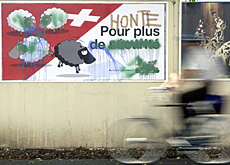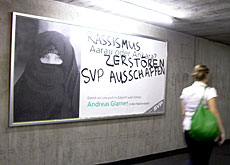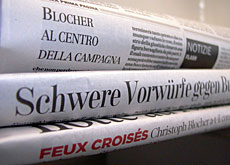British analyst assesses “black sheep” row

Foreign coverage of the rightwing Swiss People's Party's provocative campaign and immigration plans is unlikely to dent Switzerland's reputation, says an expert.
Clive Church, a leading writer on Swiss affairs, said recent articles in the British press failed to give a full picture of national political debate in which differing views are in “increasingly militant collision”.
Switzerland’s biggest political party has come under fire both at home and abroad for a controversial election campaign, which has been accused of being racist. Posters show three white sheep kicking a black sheep over the Swiss border with the caption “Create security”.
The black sheep posters underpin a People’s Party initiative to expel foreign criminals, which was launched on August 1 – Swiss National Day – three months ahead of October’s parliamentary elections.
On Friday the United Nations’ special rapporteur on racism, Doudou Diène, called on the People’s Party to withdraw the controversial election poster.
He warned that the poster would only provoke racial and religious hatred. The Swiss authorities say it is up to the courts to decide.
swissinfo: Is Switzerland really Europe’s “Heart of Darkness”, as one British newspaper claimed on its front page?
Clive Church: I think that’s rather exaggerated and overlooks the electoral statistics. The implication is that the whole nation is gripped by these views, but the reality is you have a very divided country and a furious battle, with a minority – a very big one in Swiss terms – fighting to establish itself ahead of the [October] elections.
Rather than seeing Switzerland as a country that has already succumbed to racism, you have to see it as a country engaged in a very bitter political battle fought out in a style which 20 years ago would have been unthinkable in Switzerland.
The problem for other parties is that the People’s Party has changed its political style and become much more aggressive; it has shown itself much more adept in the media age.
swissinfo: Do the actions of the People’s Party – dubbed “racist” by the Swiss president, a member of the centre-left Social Democratic Party – have the potential to damage Switzerland’s reputation abroad?
C.C.: It’s clearly not very helpful. If the Swiss are being accused of being racist, it clashes with the view of them as being highly moral.
But I’m not certain it will have a great impact. There is very little press coverage of Switzerland in Britain, so I doubt there will be much follow-up.
swissinfo: Why did the British media jump on the “black sheep” poster campaign and proposals to deport immigrants?
C.C.: This is just the latest example of an underlying tendency. If you look historically at the image of Switzerland in Britain, it tends to be dominated by negative things.
People don’t know much about Switzerland. When something like this happens, they seize upon it without knowing the context, so you get a biased view that emphasises the negative and underplays the positive.
On the other hand it is quite clear that there are resonances in what the Swiss are doing. Britain is receiving large numbers of people from outside and there is quite clearly opposition here.
The simplistic idea of being able to expel people probably appeals to fringes of British society. Obviously it’s always helpful if you can say that someone else like the Swiss, who are respected, is doing it so why don’t we.
swissinfo: One newspaper wrote that Switzerland gave a graphic illustration of the identity clash affecting Europe and the United States, where life has changed radically since the end of the Cold War. Do you agree?
C.C.: I think there has been a problem as Switzerland’s neutrality, which was very easily explicable in the Cold War age, has become less so in a global era. I think the Swiss haven’t always adapted to this, so I think there is an identity problem.
The inward-looking parts of Swiss society are uneasy about this and like to look to tradition. On the other hand you have a Switzerland that is much more outward looking and involved, and depends very largely on foreign labour.
There is an ongoing conflict between two different concepts of Switzerland.
swissinfo-interview: Simon Bradley
Based on interviews carried out at the end of August by the gfs.berne polling institute on behalf of the Swiss Broadcasting Corporation:
Swiss People’s Party 25.6% (compared with 2003 elections: -1.1%)
Social Democrats 22.6% (2003: -0.7%)
Christian Democrats 15.0% (2003: +0.6%)
Radicals 14.7% (2003: -2.6%)
Greens 10.7% (2003: +3.3%)
This is the first time Christian Democrats have ever been ahead of the Radicals in polls. The Greens have climbed back above the 10% threshold.
Expected turnout: 55% (2003: +9.6%)
2003 – Clive Church officially retired on August 31, and is now an emeritus professor.
1995 – Awarded a Jean Monnet chair in European integration.
1992 – Promoted to professor.
1981-2003 – University of Kent, England – taught a variety of historical and political courses for the School of Languages and then in the Department of Politics and International Relations.
1965-81 Lecturer in French history and from 1975 senior lecturer in European studies, University of Lancaster, England.
1963-65 Junior lecturer in modern history, Trinity College, Dublin.

In compliance with the JTI standards
More: SWI swissinfo.ch certified by the Journalism Trust Initiative












You can find an overview of ongoing debates with our journalists here . Please join us!
If you want to start a conversation about a topic raised in this article or want to report factual errors, email us at english@swissinfo.ch.